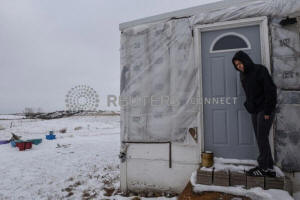|
'We know how to survive,' but U.S.
shutdown cut deep for Native Americans
 Send a link to a friend
Send a link to a friend
 [January 29, 2019]
By Stephanie Keith and Andrew Hay [January 29, 2019]
By Stephanie Keith and Andrew Hay
EAGLE BUTTE, S.D./TAOS, N.M. (Reuters) -
The Pawnee Nation of Oklahoma used a GoFundMe page and its own money to
feed its many members who were furloughed or worked without pay during
the U.S. government shutdown.
On their reservation in Eagle Butte, South Dakota, the Cheyenne used
third-party funds and dipped into tribal funds to provide food
assistance.
The 35-day partial government shutdown affected 800,000 federal workers,
but Native Americans were especially vulnerable because they rely mostly
on federal contracts for services and jobs in the Bureau of Indian
affairs for incomes.
Ivan Looking Horse, a spiritual leader at the Cheyenne Sioux reservation
in Eagle Butte, South Dakota, said they had prepared for an even longer
shutdown in the midst of a harsh South Dakota winter along the Cheyenne
River by stockpiling food and fuel.
"We are the First Nations' people. We know how to survive," he said
after President Donald Trump announced an end to the 35-day partial
government shutdown.

Federal workers caught a reprieve after Trump agreed to reopen the
government until Feb. 15, without getting the $5.7 billion he had
demanded for a border wall. Over the next 18 days lawmakers in the
ideologically divided Congress will try to craft a border security bill
acceptable to Trump.
For American Indian tribes and federal workers, that amounts to a period
in limbo while they wait to see if a deal will be reached by the Feb. 15
deadline - or if another government shutdown will again take their
paychecks hostage.
Looking Horse was cautiously optimistic. "I think they'll come to a
conclusion," he said. "This country is based on democracy and consensus
and good things will come out."
HUNDREDS OF TREATIES
Native Americans elsewhere were not so sure.
A Bureau of Indian Affairs (BIA) worker in the Navajo Nation, which
spans parts of Arizona, Utah and New Mexico, said the agency would work
fast to obtain federal grants for contracts to run basic services like
road maintenance and land management.
“Everyone is going to be working like mad for the next 2-1/2 weeks in
case he shuts it down again," said the employee, who did not want to be
identified.
BIA spokeswoman Nedra Darling said in an email, "Indian Affairs is
excited to resume our work toward fulfilling our trust responsibility
and treaty obligations for the 573 federally recognized tribes."
While stress from the shutdown -- including missed home and car
payments, food handouts and burning through savings -- affected all
federal workers and contractors, it cut much deeper for American
Indians.
[to top of second column]
|

Lynn Provost stands in front of her trailer on the Cheyenne River
Indian Reservation in Eagle Butte, South Dakota, U.S. January 25,
2019. REUTERS/Stephanie Keith

Generations ago, tribes negotiated hundreds of treaties with the
U.S. government guaranteeing funds for things like education, public
safety, basic infrastructure and health in exchange for vast amounts
of their land.
The services are administered directly by federal agencies or
through the tribes and contractors by means of grants.
With BIA offices closed by the shutdown, families receiving federal
royalty payments for oil and gas drilling and grazing on former
tribal lands did not receive checks that can be their main source of
income.
About 9,000 Indian Health Service employees, delivering health care
to about 2.2 million Native Americans and Alaska Natives, worked
without pay, according to the Health and Human Services Department's
shutdown plan.
"When our funding gets cuts, all these people are getting put on
hold for the healthcare they need,” said Terri Parton, president of
the Anadarko, Oklahoma-based Wichita and Affiliated Tribes.
Like the Cheyenne in South Dakota, the Wichita dipped into tribal
funds to prop up social services.
ERODED FAITH
After enduring government shutdowns in the 1990s, the Cherokee
Nation changed its operating model from the government's running
many of its facilities to administering services themselves with
federal money, said Chuck Hoskin, secretary of state for the
Cherokee Nation.
The latest stoppage, the 10th with furloughs since 1976, has further
eroded Native American confidence in the federal government, tribal
leaders say.
At the Pawnee Nation in Oklahoma, the GoFundMe drive was launched to
provide baskets of groceries to federal workers, even those who were
not tribe members, struggling to put food on the table, said Jim
Gray, executive director of the nation. In 16 days - the drive is no
longer accepting donations - it raised $6,343, out of a goal of
$10,000.

“We had to give up 99 percent of our land to hang onto this 1
percent and then in turn they were supposed to provide these kinds
of services as part of that treaty agreement,” Gray said.
(Reporting by Stephanie Keith in Eagle Butte, South Dakota, and
Andrew Hay in Taos, New Mexico; additional reporting by Lenzy
Kreihbul-Burton in Pawnee, Oklahoma; editing by Bill Tarrant and
Leslie Adler)
[© 2019 Thomson Reuters. All rights
reserved.]
Copyright 2019 Reuters. All rights reserved. This material may not be published,
broadcast, rewritten or redistributed.
Thompson Reuters is solely responsible for this content. |